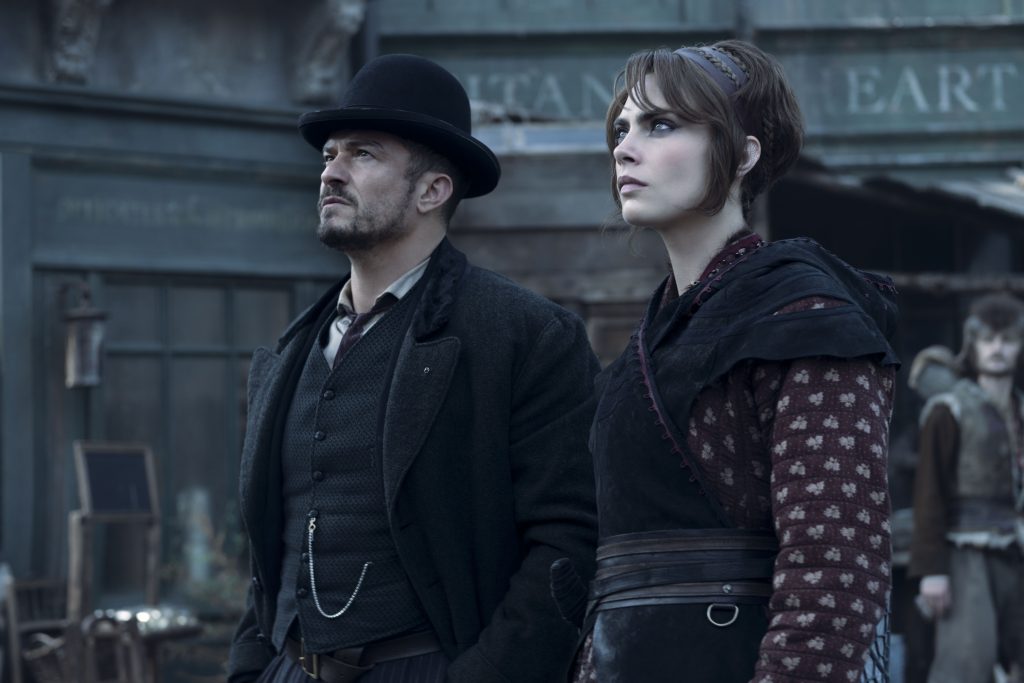Despite its visual splendor and solid performances, season 2 of Carnival Row is defeated by lackluster story and meandering plot.
Let me start off by saying that I love epic fantasies. And Amazon has shown they know how to handle these types of shows with the fantastic The Wheel of Time and intriguingly promising The Lord of Rings: The Rings of Power. So how did they (pardon the pun) miss the boat so egregiously in Carnival Row?
At first glance, the show has all the elements of a splendid piece of cinematic art: star power, compelling performances, gorgeous production design, costumes and VFX and a thrilling score. Yet all these elements can’t support a show that fails in its story elements and plot development. While I enjoyed season 1, there were some problems, but I pushed through and was looking forward to season 2. Despite a three year hiatus and delays due to COVID-19, the ten episodes of season 2 manage to retain all the problems from season 1 and compound them further.
Beyond the Burge
As the season started, I was excited to see the story expand beyond “The Row” and The Burgue. As heiress Imogen Spurnrose (Tamzin Merchant) and wealthy faun Agreus Astrayon (David Gyasi) set sail away from The Burgue in search of a place where they can love each other in peace, we are introduced to an entirely new realm of humans and fae. Unfortunately, this storyline was beset with melodrama. The only interesting thing about their journey is that it introduces us to the fae resistance group, New Dawn.
Political Tedium
Back in The Burgue, parliamentary politics take center stage, but are filled with more boredom than intrigue. Following the death of Chancellor Absalom Breakspear, his son Jonah (Arty Froushan) inherits his father’s position; a role he makes blatantly clear he has no interest in. As such, he is easily manipulated by the opposition leader, Sophie Logerbane (Caroline Ford), who also inherited her position after the bloodbath at the end of season 1.

This has all the elements of a traditional British parliamentary story line. But unlike the riveting suspense of the BBC’s 2003 limited series State of Play, it kneecaps itself with its unrelenting arguing and backstabbing that comes across as forced and tedious. Pair this with the not-so-subtle misogyny and it just becomes difficult to watch. I really admired Sophie for holding her own in a man’s world and showing that she has a shrewder business mind than the entitled sycophants she’s surrounded by. But rather than be admired or rewarded for her cunning, she is punished.
Not-So-Subtle Misogyny
And that leads me to my next big problem with the series. Carnival Row seems to have a problem with women. Despite presenting itself as a tale of strong female revolutionaries, striving to free themselves from the bondage of their male superiors, this comes across as shoehorned rather than genuine.
First of all, there are far more male characters than female in the show. All but one of the female leads and recurring stars are under the age of 30 (despite the majority of the male leads being over 40), and they insist on pairing these young women with lovers nearly twice their age. Every time I saw Imogene and Agreus together I cringed. She looks like a baby next to him.
While I’m talking about Imogene, at one point in the show she attacks Agreus with a long monologue espousing how tired she is of being controlled by men and her desire to be free. It was a great monologue, but rather than delivering it to her conniving and controlling brother, it was targeted at the one person who loved her unconditionally and only sought to protect her. (Because let’s be honest, for the majority of this show, Imogen is completely useless thanks to her entitled upbringing.)

After Amazon gave us the badass characters of Moiraine Damodred (The Wheel of Time) and Galadriel (The Lord of the Rings: The Rings of Power), Carnival Row’s women pale in comparison. I understand the show is trying to replicate the feel of Victorian England, with all of its misogyny and racism. But in this day and age, it just comes across as completely tone deaf. If they wanted to keep this Victorian backdrop, they could have looked to the show The Gilded Age on Paramount+. It was able to create a period show with strong female leads of all ages and ethnicities.
For Love or Revolution?
Our primary protagonists, Rycroft Philostrate (Orlando Bloom) and Vignette Stonemoss (Cara Delevingne), continue to spearhead the show, but their love story takes a backseat with their roller coaster story arcs. While season 1 was about forbidden love, season 2 is about political differences coming between that love. Vignette dives deeper into her work with the resistance group the Black Ravens, while Philo focuses on tracking down a savage killer. Their relationship comes to a head as they argue about the best way to protect the fae of the “Row.”

This was a hard plot point to get behind as we are introduced to a “Row” that has now become a ghetto, completely encompassed by barbwire, so no pix can fly away. I was utterly baffled as to how Philo and other fae could argue that revolution is bad when their people are literally starving and dying. If anyone needs a revolution it’s the fae of Carnival Row. The show also ends in such a way that, while the fae have more freedom than before, it makes you wonder what the point was in the first place, because it definitely wasn’t about love. Once again, an example of meandering story lines that are constantly falling off the rails.
The Actors Are the Real Heroes
Like I said above, despite the often cringe-worthy writing, the performances were strong. Bloom and Delevigne command every scene they’re in. Merchant and Gyasi do the best they can with the subpar characters and plot lines they’re given. Ford and Froushan fully embody the convictions of their characters. Simon McBurney is always a joy to watch, and his fae-loving but seemingly politically-neutral Runyan Millworthy is an excellent character for him.

But the highlights of the show for me were Karla Crome’s Tourmaline Larou and Joanne Whalley’s Leonora. Having absorbed the powers of the haruspex, Aoife Tsimani (Alice Krige), after her death at the end of season 1, Tourmaline now possesses the gift of premonition, leading to some intriguing scenes for the character. As the leader of the New Dawn, Leonara is the face of the fae resistance and Whalley plays the character with the power, confidence and conviction we’ve come to expect from her. Perhaps if we’d had more of her in Willow show on Disney+, it wouldn’t have been such a slog… But that’s another article.
Carnival Row Season 2: The Verdict
If you work in the entertainment industry and want to see an example of excellent production design, costuming and VFX, tune in for a little bit. If you’re into epic fantasy shows with lots of gruesome deaths and don’t mind a subpar story line, check it out. Or, if you just want to see a ripped Orlando Bloom with his shirt off, well, just search the internet, I’m sure you’ll be able to find picture. For the rest of you, this probably isn’t worth your time. With HBO Max’s The Last of Us and Peacock’s Poker Face, there’s no shortage of great TV right now.
Season 2 of Carnival Row premieres on Amazon Prime Friday, February 17th. New episodes of the ten-episode season will air weekly.

![Carnival Row S2 Falls as Flat as a Caged Pix [REVIEW]](https://thathashtagshow.com/wp-content/uploads/2023/02/Carnival-Row-season-2-review-1200x640.png)

![Star Wars: Rebels Zeb Mini-Bust Is A Must Have For Your Ghost Team Collection [Review]](https://thathashtagshow.com/wp-content/uploads/2023/12/review-thumb-Zeb-440x264.jpg)
![Rebel Ridge – A Ripping Actioner With Tons Of Tension [Review]](https://thathashtagshow.com/wp-content/uploads/2024/09/fe62ca86-adaa-40bc-9f4b-aaaed79a7dde-440x264.jpg)

![‘Fountain Of Youth’ Sees A Heist On A Secret Society And Epic Adventure [Trailer]](https://thathashtagshow.com/wp-content/uploads/2025/04/Fountain_of_Youth_Photo_0103.jpg.photo_modal_show_home_large-440x264.jpg)
The most likely reason for the drop in quality between seasons is that they completely replaced the creative staff in between seasons. The major writing staff of season 1, including the show’s original creator, Travis Beacham, all left in 2019, soon after season 1 aired. I don’t think the new writers who took over did nearly such a good job with the world or characters in season 2.